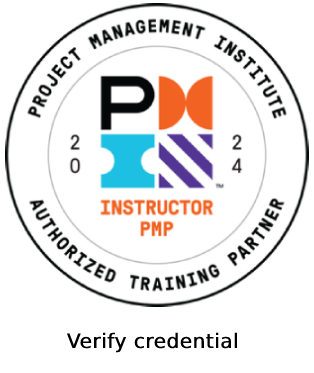Course Description
Participants of this class will learn to apply project management processes acknowledged by the Project Management Institute, Inc. (PMI)® to successfully plan and execute projects. This course will also prepare you for the CAPM® (Certified Associate in Project Management), a globally-recognized certification of excellence in project management. Upon successful completion of this course, you will be able to: obtain an understanding of how project management affects business, create a charter, identify stakeholders, create a project management plan, create a schedule, create a budget, create a risk register, and create various management plans. You will be able to analyze project risks, address project related procurement, execute the plan, and monitor and control it as needed. You will also know how to close the project, including project and contract closeout.

I was searching for a Higher opportunity in Construction Management but I found PMP. At first, I am afraid to engage with this course but a professional instructor change my mind.I decided to join PMP Free Session,he encouraged me so I attend PMP Prep Exam and (…)
Select and Register for CAPM Exam Prep Bootcamp

Key Features of CAPM Exam Prep Bootcamp
Target Audience
This course is also ideal for a person who wants to grow and formalize their project management skills on an industry neutral, global standard, the Project Management Institute, A Guide to the Project Management Body of Knowledge, (PMBOK Guide) – latest Edition, Project Management Institute, Inc. 2017-2021. This course is ideal for a leader or manager wanting to take their career and salary to the next level in earning the globally recognized CAPM® credential. Certified Associate in Project Management (CAPM)®, Project Management Institute, Inc. (PMI)®, and PMBOK® Guide are all registered marks of the Project Management Institute, Inc.
Job roles that can benefit from CAPM training include, but are not limited to:
- Project Executives, Team Members
- Project Management Aspirants
- Managers
- Project Leaders
- Functional Managers
- Anybody who wishes to gain better understanding of practical and formal project management best practices
Certified Associate in Project Management (CAPM) Benefits
CAPM® Certified Associate in Project Management is one of the most valuable certifications for individuals in the Project Management field. It is suitable for project professionals who have project management related duties and wish to enhance their career. CAPM certification training is designed for professionals who have minimum experience in project management. The course structure gives them a basic understanding of the subject and it is a massive value-added skill to their resume. Some of the benefits of obtaining the CAPM certificate also includes:
- Demonstrates understanding of project management fundamentals, terminology and processes
- Conveys your dedication to prospective employers
- Project Management is a wonderful career option as it spans across multiple industries
- Gives an edge in the job market
Eligibility Criteria for CAPM Certification Exam
| Educational Background | Project Management Education | |
|---|---|---|
| Secondary diploma (high school diploma/global equivalent) | AND | 23 contact hours of formal education |
To be eligible for the CAPM certification, you need a school diploma or global equivalent and must meet the education requirements.
- Project Victor’s Designed CAPM Exam Course Material (Hard Copy)
- Access to Project Victor CAPM Exam Simulator which includes access to more than 2500 realistic CAPM exam sample questions (including new Agile questions).
- Project Victor’s Multi-colored Process Chart.
- Project Victor CAPM Certificate of Completion (officially certified by a PMI Authorized Training Partner), which will be useful in case of a PMI Application Audit.
- CAPM Examination notes highlighting the important topics and details to remember and review prior to the exam.
- PMI® Contact Hours: Each Contact Hour is 1 PDU (Total of 23 Contact Hours/PDUs for full course) – delivered by PMI Authorized Training Partner.
- One-to-One coaching to prepare the CAPM Exam Application prior to submission to PMI.
- 3-Days at a reputable hotel that includes 2 coffee breaks and International Buffet lunch.
- President of PMI Thailand Chapter for 13 years (2011-2023).
- Currently Past President and Chapter Counselor.

- He is a PMI licensed training instructor – profile on PMI global website.
- He is a Certified Program Management Professional (PgMP®) (Project Management Institute – www.pmi.org); Certificate # 2079271.
- He is a Certified Project Management Professional (PMP/CAPM®) (Project Management Institute – www.pmi.org); Certificate #1258917
- He is an Agile Certified Practitioner (PMI-ACP®) (Project Management Institute – www.pmi.org); Certificate #2600926
- He is a Certified Scrum Master (CSM®) (Scrum Alliance – www.scrumalliance.org); Certificant ID: 001062861
- He is a SAFe Program Consultant (SPC)® 6.0; Certificate ID: 50804412-3031
- He is a SAFe Agilist® 6.0 (www.scaledagile.com); Certificate ID: 23353981-8934
- He is Certified Risk Management Professional (RMP®) (Project Management Institute – www.pmi.org); Certificate #2033120
- He has experience managing and leading mega-projects (Information Technology, Airport-related, CCTV-related, Transport-related, and Power Infrastructure) in various industries.
- He is a commercial contract manager, reviewer, and advisor.
- He teaches part-time at King Mongkut University of Technology (Thonburi) – Graduate School of Management and Innovation (Master Degree in Project Management). He is an invited lecturer to Chulalongkorn University.
- He holds a Doctorate degree obtained from Assumption University of Thailand with an international record of publications in refereed journals with a special concentration on business management.
- He has trained more than 5000 program/project managers, project engineers, project coordinators, and project team members since 2010.
- He has helped certify more than 800 Project Management Professionals (PMP/CAPM/PMI-ACP) in Thailand.
- He is also a highly experienced speaker and trainer who is also passionate about Project Management.
- Passionate about the Agile methodologies and their applications in different business environments
Delivery Method
The instructor will lead this course by providing practical examples and case studies from his experience managing and delivering projects in Thailand.
Course Duration
- Three Days (equivalent to 23 Contact Hours or Professional Development Units – PDUs)
Detailed Course Syllabus
PMP Exam Prep Bootcamp
฿45,000.00
PMP Exam Sneak Peek
฿4,000.00
Introduction to PMBOK V7
฿4,000.00
PMP Exam Prep Practice Questions
฿4,000.00
Course Objectives
By the end of this CAPM training, you will:
- Understand all ten project management knowledge areas, including integration, scope, time, cost, quality, resources, communications, risk, procurement, and stakeholder management.
- Develop the fundamentals of implementing standard processes and practices to be successful in delivering projects (including both predictive and adaptive lifecycles)
- Acquire the relevant knowledge and skills required to pass the CAPM® certification exam
- Become an efficient project manager and become a valuable member of a project management team
Course Agenda
This module introduces the basics of project management. This lays the foundation for all of the coming modules to ensure that participants understand how the PMBOK® Guide defines a project, project management, programs, portfolios, and operations. You will also learn about the importance of tailoring and review a number of project management business documents including business case, project charter, and benefits management plan.
This module introduces you to the all-important concepts of Organizational Process Assets and Enterprise Environmental Factors, which are referred back to in Module 4-13. You will also see a number of governance frameworks as well as how management structures and organizational structure types will influence projects and either support or hinder your ability to lead and manage the work.
Participants will learn to develop the project charter in order to ensure project stakeholders are in agreement. You also present the project management plan to the relevant stakeholders in order to obtain approval to proceed with project execution. You learn how to implement all project activities, measure project performance, and manage any changes to the project. Lastly, this is where you learn how to close a project. You’ll also learn how Agile teams self-direct and self-organization to integrate all necessary project work to complete and deliver the project.
Participants will learn that managing the scope requires you to identify key deliverables based on the business requirements. You’re taught to review and assess detailed project requirements, constraints, and assumptions with stakeholders based on the project charter, lessons learned, and by using requirement gathering techniques in order to establish detailed project deliverables. The module also walks you through the development of a scope management plan, based on the approved project scope and using scope management techniques.
Developing the project schedule requires participants to understand how scope, resources, cost, and activity durations affect each other. You will see, step by step how to go from a simple activity list to the completed schedule (Waterfall and Agile). This development of the project schedule is done based on the approved project deliverables and milestones, scope, and resource management plans in order to manage timely completion of the project. Lastly, you learn how to control the schedule by applying appropriate tools and techniques.
Participants will learn how Earned Value Management techniques works. This is one of the most important concepts you must understand for the CAPM exam. We’ll explain this to you step by step until you understand how to develop a realistic budget or cost baseline for your project. In addition, you will also learn to develop the cost management plan based on the project scope, schedule, resources, approved project charter and other information, using estimating techniques, in order to manage project costs.
Participants will learn to develop the quality management plan and define the quality standards for the project and its products, based on the project scope, risks, and requirements. This helps prevent the occurrence of defects and controls the cost of quality. You’ll also see how to implement the quality management plan and ‘build quality into the product’ using the appropriate tools and techniques. Lastly, you’ll learn how to verify that project deliverables conform to the quality standards established in the quality management plan to meet project requirements and business needs.
This module is all about your interactions with project resources. In particular, you learn how to develop the resource management plan by defining the roles and responsibilities of the project team members in order to create a project organizational structure and provide guidance regarding how resources will be assigned and managed. You will also see how to manage task execution based on the project management plan by leading and developing the project team in order to achieve project deliverables.
This module reviews the development of the communications management plan based on the project organizational structure and stakeholder requirements, in order to define and manage the flow of project information. It discusses how to manage the flow of information by following the communications plan to keep stakeholders engaged and informed. You also learn how to prepare and share the final project report according to the communications management plan in order to document and convey project performance and assist in project evaluation.
You learn how to identify high-level risks, assumptions, and constraints based on the current environment, and plan for risk management by developing a risk management plan. You also see how to implement approved actions, and monitor and assess risk by determining whether exposure has changed and evaluate the effectiveness of response strategies in order to manage the impact of risks and opportunities on the project.
Participants will learn how to develop the procurement management plan based on the project scope, budget, and schedule, in order to ensure that the required project resources will be available. Additionally, we discuss how to monitor procurement activities according to the procurement plan in order to verify compliance with project objectives. Participants will also spend time in reviewing the various contract types you need to know about for the exam.
This module introduces participants to the stakeholder analysis and how to use appropriate tools and techniques in order to align expectations and gain support for the project. See how to develop the stakeholder management plan by analyzing needs, interests, and potential impact in order to effectively manage stakeholders’ expectations and engage them in project decisions. It also includes how to maintain stakeholder relationships by following the stakeholder management plan in order to receive continued support and manage expectations.
We’ve Trained Professionals
across Global Companies













































Need more information on Trainings?
We’re a click away
Free Shipping
Free Shipping for orders over £130
Money Guarantee
Within 40 days for an exchange.
Flexible Payment
Pay with Multiple Credit Cards
Online Support
24 hours a day, 7 days a week
Don't compromise on quality!
Subscribe to the newsletter
- TEL : 0980 444 45 456
- MAIL : hello@demo.com
Don't compromise on quality!
- TEL : 0980 444 45 456
- MAIL : hello@demo.com
About Wooma
Help
Categories
Campaigns
Company
Resources
Contact Details
-
200/05, Narathiwat Ratchanakarin Road,
Chongnonsi Yannawa, Bangkok 10120 - info@projectvictor.com
- (66) 92 348 4772
- (66) 02 294 2492
- Upcoming Courses :-
Copyright © 2025. Project Victor Co., Ltd. All Rights Reserved.
- Call us on (66) 92 348 4772
“PMI,” “PMP,” “CAPM,” “PMI-ACP,” “PMBOK,” and the PMI Authorized Training Partner logo are registered marks of the Project Management Institute, Inc.
“ITIL®,” “PRINCE2®,” “MSP®,” and “P3O®” are registered trademarks of AXELOS Limited, used under permission of AXELOS Limited. View Disclaimer





